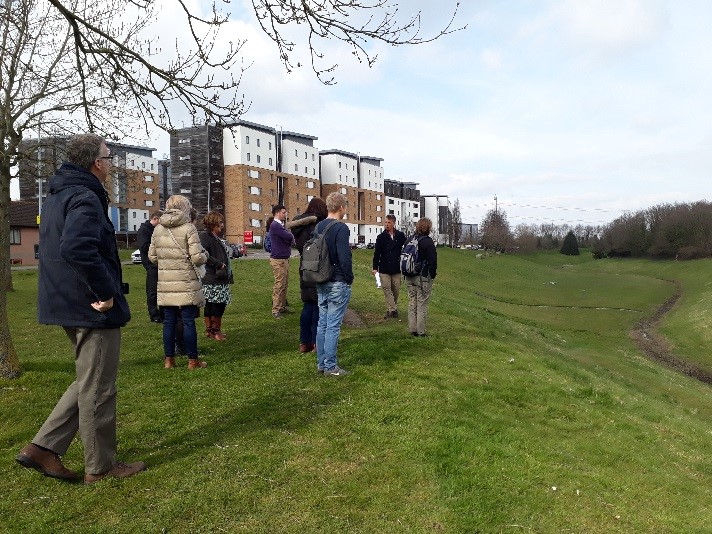 As the UN had decided that ‘the answer is in nature’, with nature-based solutions forming the theme of this year’s World Water Day (22nd March), the International Water Security Network took up the challenge and organised a range of activities with a ‘nature for water’ theme.
As the UN had decided that ‘the answer is in nature’, with nature-based solutions forming the theme of this year’s World Water Day (22nd March), the International Water Security Network took up the challenge and organised a range of activities with a ‘nature for water’ theme.
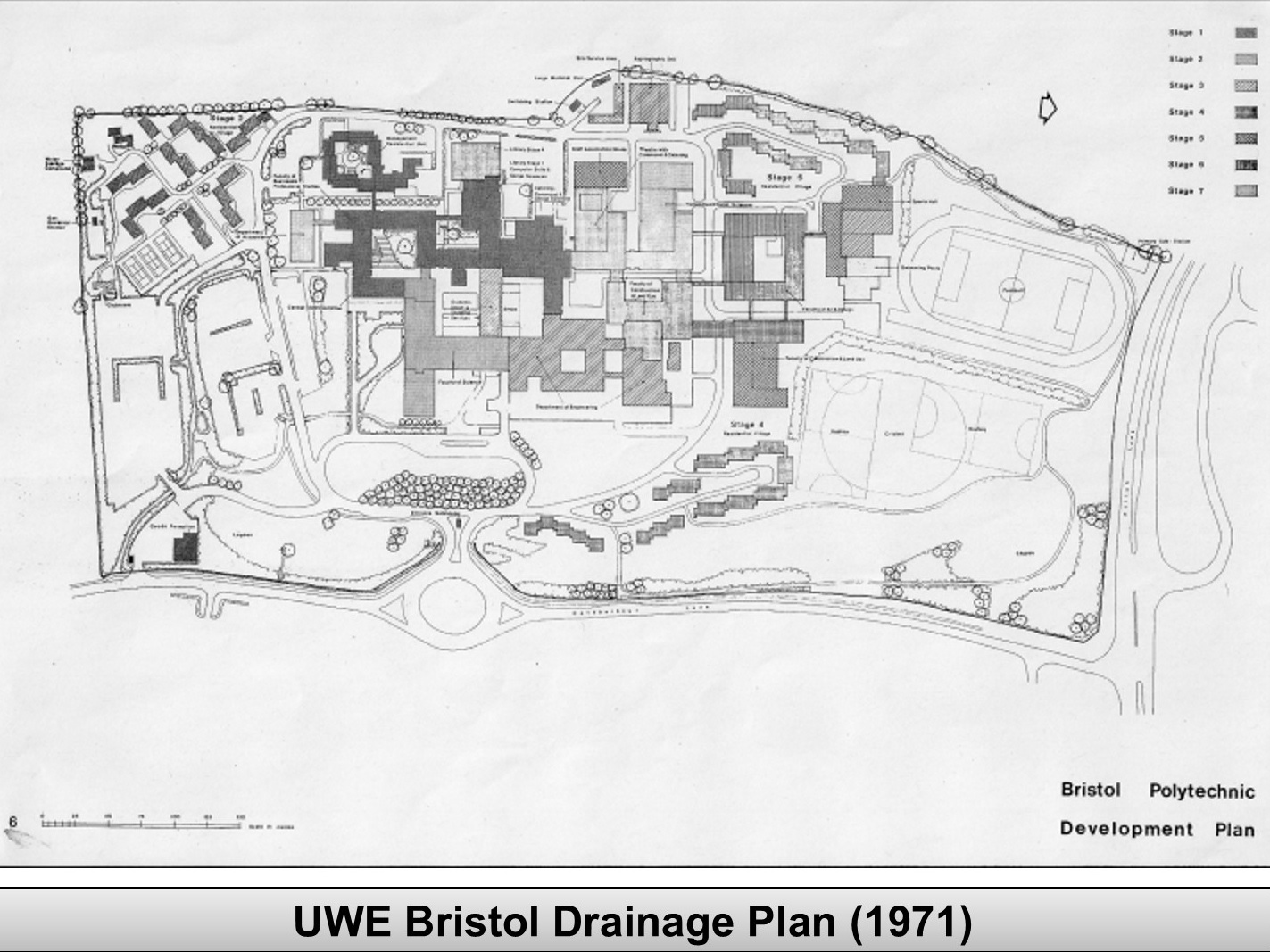 On Wednesday 21 March we led one of UWE’s popular lunchtime walks, focusing on the sustainable drainage features on the Frenchay campus – small and large ponds, a permeable surface car park and the huge attenuation swale, planted up with known hydrophilic species.
On Wednesday 21 March we led one of UWE’s popular lunchtime walks, focusing on the sustainable drainage features on the Frenchay campus – small and large ponds, a permeable surface car park and the huge attenuation swale, planted up with known hydrophilic species.
The explanation of the latter proved really popular with the walkers, as the perception in places around campus was that it was simply an uncared-for ditch (see photo; and bottom right on the drainage plan). One walker commented: “I knew where the various lakes were and the path of the water…but not how effectively it had been planned, especially the run-off from the car parks”.
Interestingly the scheme was originally conceived in the early 1970s when the Frenchay Campus build was initiated – long before the built environment professions talked about SuDS.
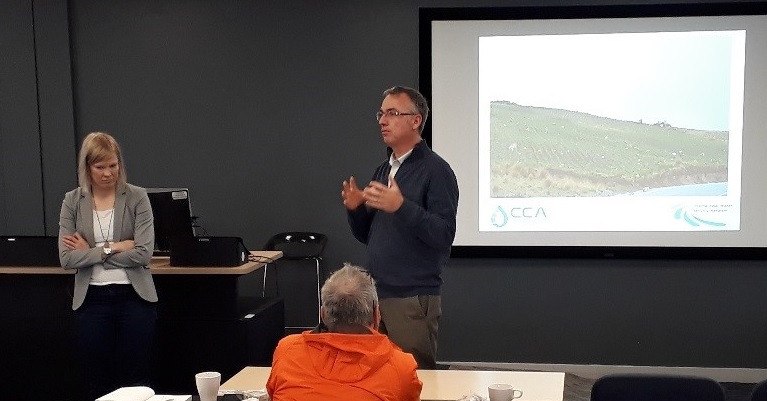 The walk was followed by a seminar in the Faculty of Environment and Technology, with guest speakers Bram Willems from Centro de Competencias del Agua in Peru and Riitta Syvälä from Tampere University of Technology, Finland. Bram spoke about recent changes in agriculture and water quality, and how different land management practices are being adopted to address the challenges they face. Riitta spoke about stormwater management in Finland, focusing on the legislative and organizational challenges of managing stormwater more effectively. A lively question and answer session then broadened perspectives out to how to engage communities around nature-based solutions and how to ensure equitable access to different types of green infrastructure to ensure social inclusivity.
The walk was followed by a seminar in the Faculty of Environment and Technology, with guest speakers Bram Willems from Centro de Competencias del Agua in Peru and Riitta Syvälä from Tampere University of Technology, Finland. Bram spoke about recent changes in agriculture and water quality, and how different land management practices are being adopted to address the challenges they face. Riitta spoke about stormwater management in Finland, focusing on the legislative and organizational challenges of managing stormwater more effectively. A lively question and answer session then broadened perspectives out to how to engage communities around nature-based solutions and how to ensure equitable access to different types of green infrastructure to ensure social inclusivity.

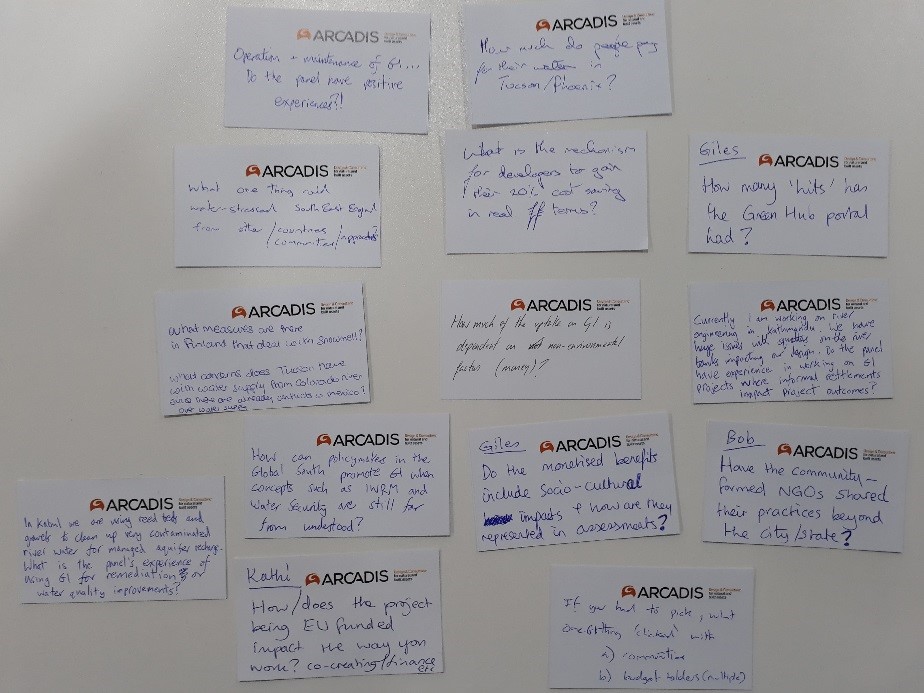 On World Water Day itself (Thursday 22 March), an evening panel debate entitled ‘How can green infrastructure boost urban resilience’ was held at Arcadis’ Glass Wharf offices in Bristol, in conjunction with Arcadis and Bristol Water.
On World Water Day itself (Thursday 22 March), an evening panel debate entitled ‘How can green infrastructure boost urban resilience’ was held at Arcadis’ Glass Wharf offices in Bristol, in conjunction with Arcadis and Bristol Water.
Over 30 delegates attended to share in an inspiring discussion on global perspectives on nature for water. Alongside Chad Staddon, who gave a brief introductory presentation (PDF here), the panel comprised international voices including:
- Kathi Bauer, Westcountry Rivers Trust
- Giles Booth, Global Leader, Intelligent Water Networks, Arcadis (PDF of presentation here)
- Riitta Syvälä, Tampere University of Technology, Finland (PDF)
- Robert Varady, University of Arizona, USA
- Bram Willems, Centro Competencias del Aguas, Peru (PDF)
The panel told stories from as close to home as Taunton and Bicester, to more distant locales in the Americas, Europe, India and China. Questions from the audience further opened up narratives from projects in Kathmandu and Kabul, ensuring a full range of challenges and opportunities were exchanged during the evening discussions and networking.
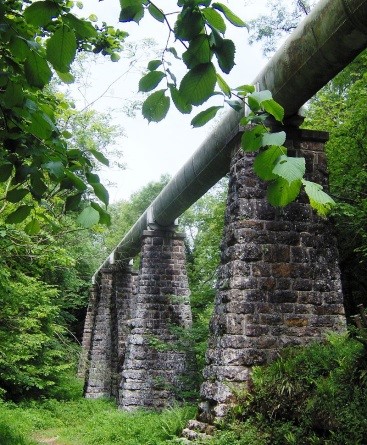 On Friday 23 March, Bristol Water hosted a field trip focusing on the use of partnerships for catchment-based approaches, covering key improvements and management practices undertaken.
On Friday 23 March, Bristol Water hosted a field trip focusing on the use of partnerships for catchment-based approaches, covering key improvements and management practices undertaken.
Patric Bulmer and Matthew Pitts from Bristol Water led a tour of Bristol Water’s historic 19th century Line of Works starting at Chew Stoke Pumping Station and taking in the original spring ‘where it all began’, as well as the magnificent Victorian aqueduct that carries up to 40 megalitres of water per day down to the Chew Lake and Blagdon reservoirs.
It was amazing to see the line of works, now 170 years old, still functioning brilliantly.
At each stop, Matt and Patric told us a little more about how Bristol Water is working with land owners to preserve the natural environment and even to enhance it, so that Bristol’s water supply is also enhanced and protected.
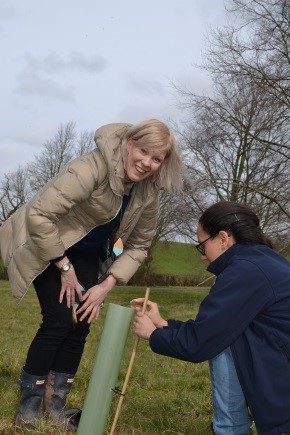 One of the most poignant examples of Bristol Water’s collaborative approach was demonstrated at a farm near Winford where Bristol Water has worked with beef farmers to prevent animal-related impacts on water quality (for example, via trampling and the run-off of manure into local water courses). Some measures taken are as simple as providing a wet weather feeding shed, whilst others are more complicated as they involve rethinking haylage and silage processes. Tour members were really impressed with the enthusiasm of local farmers for nature-based solutions and for working with their local water company.
One of the most poignant examples of Bristol Water’s collaborative approach was demonstrated at a farm near Winford where Bristol Water has worked with beef farmers to prevent animal-related impacts on water quality (for example, via trampling and the run-off of manure into local water courses). Some measures taken are as simple as providing a wet weather feeding shed, whilst others are more complicated as they involve rethinking haylage and silage processes. Tour members were really impressed with the enthusiasm of local farmers for nature-based solutions and for working with their local water company.
In collaboration with SceneIT, the cinema on the main UWE campus, water-themed films were shown throughout March including North of the Sun, A Plastic Ocean and Women and Water.
First held in 1993, World Water Day is coordinated globally by UN Water “as a means of focusing attention on the importance of freshwater and advocating for the sustainable management of freshwater resources”. Recently, IWSN has co-hosted World Water Day events in United Arab Emirates (2016), Vatican City (2017) and Bristol (2018). Plans are underway for co-hosting World Water Day events in 2019 in India.
